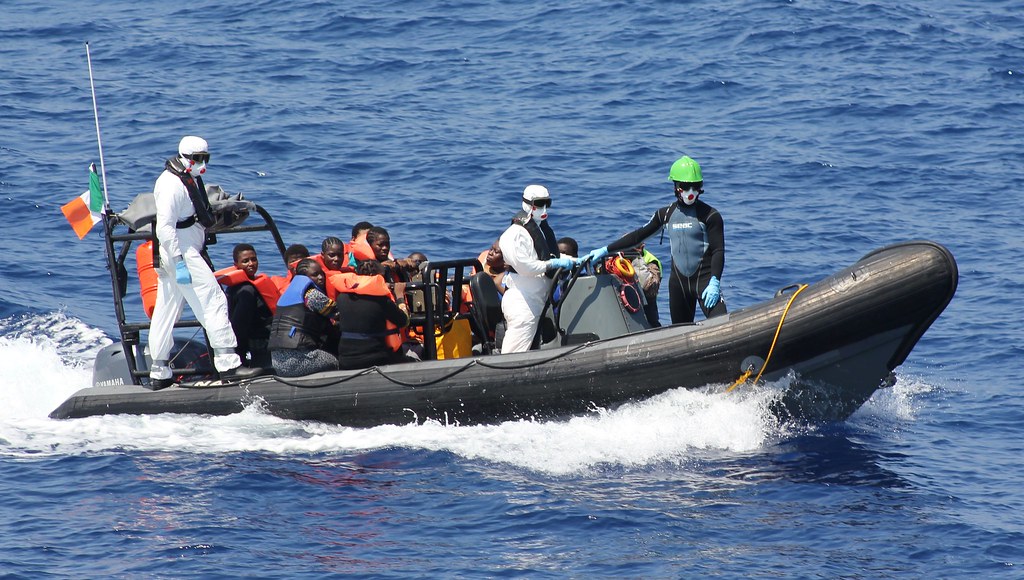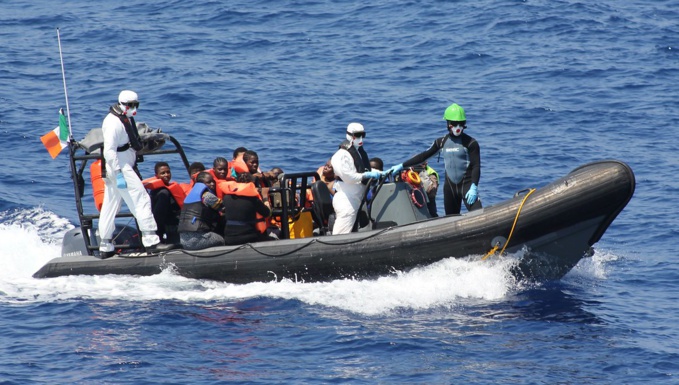Cyprus is now the most popular migration destination. This island was in first place in Europe in the number of migrants per capita.
In the first four months of this year alone, 4.5 thousand applications for asylum were filed in the Republic of Cyprus, while local population is just 850 thousand people. The number of such applications is steadily growing. In 2018, there were 70% more of them than a year earlier, while in 2017 there was also an increase in the number of applications compared with the previous year.
In total, as of July 1, 2019, Cyprus provided asylum to 15 thousand migrants. About the same number of applications are currently under consideration. In total, this makes more than 3.5% of the island’s population. Recall that in Germany, at the peak of the crisis with migrants, their number only slightly exceeded 1% of the country's population.
Last year, Syrians accounted for about a quarter of the total number of migrants in Cyprus. The Syrians, according to Eurostat, are followed by Indians, Bangladeshis, Pakistanis and Cameroonians.
The influx of migrants to Cyprus can be explained by the island’s geographical position. It is located not far from Lebanon and Turkey, and therefore attracts Syrians fleeing civil war.
Cyprus itself states the situation is critical despite assertions of Brussels that the number of refugees in the eastern part of the Mediterranean, which includes Cyprus, Bulgaria and Greece, has decreased by 90% in 2018, compared with 2015. This is probably why the political capital of the united Europe hardly believes in complaints of the Cypriots about the migration crisis. Nevertheless, it is difficult to overestimate difficulty of the situation here.
The situation with migrants is complicated by the unique political situation, because Nicosia, the capital of the Republic of Cyprus, a member of the EU since 2004, controls less than two thirds of the territory. For 45 years, 38% of the island in the north have been part of the Turkish Republic of Northern Cyprus recognized only by Turkey.
In 2016, the European Union and Turkey entered into an agreement under which Ankara, in exchange for monetary compensation, kept refugees in Turkish camps away from Europe. This agreement mainly contributed to a sharp decline in the number of migrants entering the EU through the Balkans and the Greek islands. However, the Turkish government did not extend the ban to Cyprus, where access to refugees from the territory of Turkey is still open.
The vast majority of migrants arrive in Cyprus by water. In 2018, according to the UN High Commissariat for Refugees (UNHCR), 43 vessels were recorded with refugees off the coast of Cyprus. Nicosia recently announced a sharp increase in number of migrants in the northern part of the island, where they arrive by air. From there, they cross the border between the northern and southern parts of the island - the Green Line, which is patrolled by UN peacekeepers.
The influx of migrants also creates certain problems for Brussels. Cyprus, together with other Mediterranean EU members, demands that the rest of the united Europe help accommodate refugees, but Central European countries, Hungary and Poland, strongly oppose this. And requests and demands of Nicosia do not cause much enthusiasm in the rest of European countries.
The influx of refugees in the last couple of years has been straining the local system of receiving migrants. There is only one camp for migrants - in Kofinu, a picturesque village with a church painted with Byzantine frescoes. It is designed for 350 people and is already full. The government plans to build two more such centers and bring their capacity to a thousand, but this will only very slightly improve the situation.
There are fears that the growing pressure of migrants will lead to a sharp increase in populism. The first signs of this are already there. In the May elections to the European Parliament (EP), the ultra-right Elam party, created in 2008 as a branch of the Greek Golden Dawn, won, receiving 8.25% of the vote, i.e. significantly more than in 2014 (2.69%). However, 8% of the Cypriot ultra-right was not enough to go to the EP.
source: politico.eu
In the first four months of this year alone, 4.5 thousand applications for asylum were filed in the Republic of Cyprus, while local population is just 850 thousand people. The number of such applications is steadily growing. In 2018, there were 70% more of them than a year earlier, while in 2017 there was also an increase in the number of applications compared with the previous year.
In total, as of July 1, 2019, Cyprus provided asylum to 15 thousand migrants. About the same number of applications are currently under consideration. In total, this makes more than 3.5% of the island’s population. Recall that in Germany, at the peak of the crisis with migrants, their number only slightly exceeded 1% of the country's population.
Last year, Syrians accounted for about a quarter of the total number of migrants in Cyprus. The Syrians, according to Eurostat, are followed by Indians, Bangladeshis, Pakistanis and Cameroonians.
The influx of migrants to Cyprus can be explained by the island’s geographical position. It is located not far from Lebanon and Turkey, and therefore attracts Syrians fleeing civil war.
Cyprus itself states the situation is critical despite assertions of Brussels that the number of refugees in the eastern part of the Mediterranean, which includes Cyprus, Bulgaria and Greece, has decreased by 90% in 2018, compared with 2015. This is probably why the political capital of the united Europe hardly believes in complaints of the Cypriots about the migration crisis. Nevertheless, it is difficult to overestimate difficulty of the situation here.
The situation with migrants is complicated by the unique political situation, because Nicosia, the capital of the Republic of Cyprus, a member of the EU since 2004, controls less than two thirds of the territory. For 45 years, 38% of the island in the north have been part of the Turkish Republic of Northern Cyprus recognized only by Turkey.
In 2016, the European Union and Turkey entered into an agreement under which Ankara, in exchange for monetary compensation, kept refugees in Turkish camps away from Europe. This agreement mainly contributed to a sharp decline in the number of migrants entering the EU through the Balkans and the Greek islands. However, the Turkish government did not extend the ban to Cyprus, where access to refugees from the territory of Turkey is still open.
The vast majority of migrants arrive in Cyprus by water. In 2018, according to the UN High Commissariat for Refugees (UNHCR), 43 vessels were recorded with refugees off the coast of Cyprus. Nicosia recently announced a sharp increase in number of migrants in the northern part of the island, where they arrive by air. From there, they cross the border between the northern and southern parts of the island - the Green Line, which is patrolled by UN peacekeepers.
The influx of migrants also creates certain problems for Brussels. Cyprus, together with other Mediterranean EU members, demands that the rest of the united Europe help accommodate refugees, but Central European countries, Hungary and Poland, strongly oppose this. And requests and demands of Nicosia do not cause much enthusiasm in the rest of European countries.
The influx of refugees in the last couple of years has been straining the local system of receiving migrants. There is only one camp for migrants - in Kofinu, a picturesque village with a church painted with Byzantine frescoes. It is designed for 350 people and is already full. The government plans to build two more such centers and bring their capacity to a thousand, but this will only very slightly improve the situation.
There are fears that the growing pressure of migrants will lead to a sharp increase in populism. The first signs of this are already there. In the May elections to the European Parliament (EP), the ultra-right Elam party, created in 2008 as a branch of the Greek Golden Dawn, won, receiving 8.25% of the vote, i.e. significantly more than in 2014 (2.69%). However, 8% of the Cypriot ultra-right was not enough to go to the EP.
source: politico.eu



















